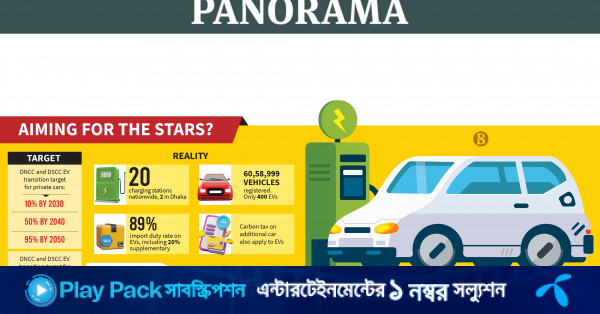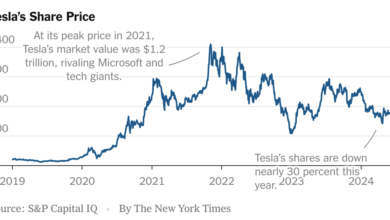Is Dhaka ready for an all-electric automobile ecosystem?

The city authorities are promising a future where 95% of private cars and 100% of public transport are electric by 2050. With only two charging stations and a mere 400 EVs registered today, can this vision become reality?
Imagine a Dhaka where nearly every car is electric, the air is cleaner, and the city leads in the global fight against climate change. Dhaka North and South City Corporations have just unveiled a bold climate action plan, promising a future where 95% of private cars and 100% of public transport are electric by 2050. But with only two charging stations and a mere 400 EVs registered today, can this vision become reality?
On 12 May Dhaka North and South City Corporation (DNCC and DSCC) unveiled Dhaka’s first-ever Paris Agreement-aligned climate action plans. The plans will serve as a roadmap for Dhaka North and Dhaka South to become carbon-neutral by 2050, aligning with Bangladesh’s National Commitment of conditional emissions reduction target.
Both city corporations aim to cut emissions by 14.9% by 2030 and 33.8% by 2040, compared to the 2021-22 fiscal year baseline. The ultimate target is a 70.6% reduction by 2050.
And reducing vehicular emission is an important part of that plan.
Overly optimistic?
A key target in the action plan is to completely electrify Dhaka’s public transportation system by 2040. Private vehicle ownership will also see a significant shift, with 95% going electric by 2050.
By 2030, 10% of private vehicles will transition to electric, reaching 50% by 2040. Moreover, 80% of public transportation will be electric by 2030, escalating to 100% by 2040.
Such rapid growth is tough to achieve, opined Dr M Hadiuzzaman, Professor of Civil Engineering Department and the Director of BUET’s Accident Research Institute.
“We have twenty-five years till 2050. The market penetration of EVs required to achieve such ambitious targets is hard. Roadmaps are good, but they should be compatible with our current scenario.”
Car manufacturers, however, think that with growing government support and the development in EV technology, market penetration can significantly rise in future.
“Transition to EV is both a good business opportunity and a good environmental cause,” said Zakaria Kabir, the lead of retail sales, CG Runner BD Ltd, the official distributor of BYD in Bangladesh. BYD launched its operations in Bangladesh on 2 March 2024.
“EVs are just perfect for our country. Since the country is small, the range of EVs will be easily able to cover the distance of commute.”
Ashifur Rahaman Khan, Sales Advisor at Progress Motors Imports Ltd, the official distributor of Audi in Bangladesh, is also optimistic. “I have seen how the interest in EVs has increased in the last year. Policy support is driving our business as well. Many of our existing clients are exchanging their combustion cars for EVs.”
How prepared is our infrastructure?
Despite the buzz, it seems the necessary infrastructure is lacking in Dhaka. Currently, about 20 charging stations have been installed nationwide for such vehicles.
Farzana Bobby, assistant city planner of DNCC, was in-charge of the climate action plan. She agrees that the current infrastructure is not yet compatible with EVs.
“It is no secret, you know it too,” she said, “but we wanted to set an ambitious target. That way, even if we can achieve a part of it, that will be a great success.”
“By 2030, we expect the number of vehicles to decrease, as we will have metrorail coverages all across the city. So, it will be easier to transition to a greener Dhaka.”
But, the transition hinges on the current infrastructure, which is yet virtually non-existent.
The BRTA is taking up projects to procure electric vehicles, and discussions are ongoing with a Korean company for a $10 million project to establish charging stations.
Incentives such as the 10-year tax holiday for investing in energy-efficient vehicle assembly, scrapping subsidies, and charging station development are part of the plan to make Bangladesh a hub for energy-efficient vehicles.
BRTC, meanwhile, is implementing five electric vehicle projects totaling Tk3,450 crore. These include plans for 100 electric double-decker AC buses, 200 electric single-decker AC buses, and 55 charging stations.
The question of preparedness looms large over the private automakers as well. They need to be proactive to set up necessary infrastructure to boost their sales.
“We are working with Reverie Power, United Payra Power and Genex Infrastructure to set up our charging stations across the country. We will share investments,” said Zakaria Kabir.
“We are also talking to major refuelling stations on major highways to come into an agreement to set up our charging stations at their facilities. It is an important aspect, as these refuelling stations have their own transformer, which we need for our stations,” Zakaria Kabir added, “Our goal is to set up at least 50 charging units across the country within this year. And, ten of those will be inside Dhaka City.”
Audi is preparing infrastructure as well. There are six ongoing projects across the country, and two operational charging units.
Bangladesh Auto Industries Limited (BAIL) has invested Tk1,440 crore in a factory in Mirsharai, Chattogram, to produce electric vehicle components such as bodies, batteries, motors, and chargers.
It is not just about cars
Electric vehicles (EVs) depend heavily on a sophisticated ecosystem that includes expert programmers, skilled mechanics, advanced charging infrastructure, and comprehensive support services.
The development of a robust EV infrastructure necessitates substantial investment and planning. Charging stations need to be widespread and conveniently located to support daily use and alleviate range anxiety among potential users.
“We need an integrated planning and policy for this,” said Dr Hadiuzzaman, “we can not do it by taking haphazard steps.”
Furthermore, the maintenance and repair of EVs require mechanics trained specifically in EV technology, which involves both electrical and software expertise.
“We need a paradigm shift in the maintenance workshops. They are trained in ICE (internal combustion engine) vehicles. So, they would need time to adapt to the new ecosystem. We need more skilled technicians,” Dr Hadiuzzaman added.
Moreover, the integration of EVs into a smart ecosystem involves the development of smart grids, energy management systems, and policies that support sustainable energy sources. Without these, the efficiency and environmental benefits of EVs cannot be fully realised. Uninterrupted power supply is especially an issue at present.
“Our Rooppur Nuclear Power Plant will be operational soon,” said Zakaria Kabir, “then, I think our electricity shortage will be over. And when we will have uninterrupted electricity, local businesses will be interested to work with us to promote EV as well.”
Sluggish growth of EV
As per the Bangladesh Road Transport Authority (BRTA), 60,58,999 vehicles have been registered till April 2024. But only 400 EVs have been registered till now. That is only a very small fraction of the whole percentage.
To achieve the goal of 30% adoption by 2030, more EV penetration is necessary. EVs have remained a luxury item reserved only for the ultra-rich. And the distributors acknowledge it.
“Yes, it is true that people will not buy the Tk1 crore BYD Seal on a mass scale,” said Zakaria Kabir, “but we are planning to introduce cheaper options, priced at about Tk20 lac to Tk30 lac soon. We hope that as the infrastructure develops more, EV sales will pick up.”
Government intervention is necessary to reduce the initial cost of EVs. At the same time, some policy changes are necessary.
Currently, the import duty rate on electric vehicles is 89%, including 20% supplementary duty. For owners of several cars, the NBR imposed a carbon tax or environmental surcharge.
The owner of a vehicle with an engine capacity of up to 1,500cc or 75kW is required by the move to pay an environmental surcharge of Tk 25,000. For a car with an engine capacity of 1,501cc to 2,000cc or more than 75kW to 100kW, the additional cost is doubled to Tk 50,000. And it applies to EVs also.
Also, Sub-section 4.1.1 of the Electronic Vehicle Charging Guidelines (2022) mandates EV owners to pay charging fees based on household retail tariff rates.
EV transition is inevitable within 2050 anyway
Given the rapid advancements in EV technology and the global push towards sustainable transportation, it is plausible that the transition to EVs will occur naturally by mid-century, without any significant intervention from local authorities.
“Major automobile manufacturers are already setting ambitious timelines to phase out internal combustion engines, with many targeting full electrification by the 2030s and 2040s. So, EVs will be widespread, and cheap enough for everyone to afford,” said Ashif Rahaman Khan, adding “EV is the future.”
Zakaria Kabir echoed this as well, “The demand for private cars will not go away. And when the customers want to purchase a private car, they will have to buy an EV or a hybrid. Internal combustion engine (ICE) cars will be obsolete.”


